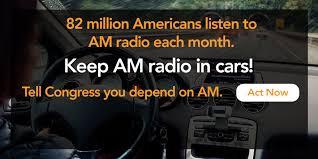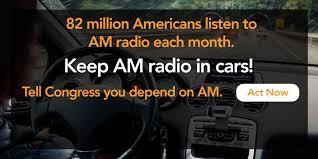
WASHINGTON – Wednesday the AM for Every Vehicle Act, bipartisan and bicameral legislation that would direct federal regulators to require automakers to maintain AM broadcast radio in their new vehicles at no additional charge was introduced.

Supporting the legislation are Senators Edward J. Markey (D-Mass.) and Ted Cruz (R-Tex.), along with Senators Tammy Baldwin (D-Wis.), Deb Fischer (R-Neb.), Ben Ray Luján (D-N.M.), and J.D. Vance (R-Ohio), members of the Senate Commerce, Science, and Transportation Committee, and Representatives Josh Gottheimer (NJ-05), Tom Kean, Jr. (NJ-07), Rob Menendez (NJ-08), Bruce Westerman (AR-04), and Marie Gluesenkamp Perez (WA-03)
The legislation follows from the letter that Senator Markey sent to 20 of the world’s leading carmakers last year requesting that they maintain access to AM broadcast radio in their vehicles. Of the 20 carmakers, eight had removed AM broadcast radio from their electric vehicles.
Specifically, the AM for Every Vehicle Act would:
- Direct the National Highway Traffic Safety Administration (NHTSA) to issue a rule that requires automakers to maintain AM broadcast radio in their vehicles without a separate or additional payment, fee, or surcharge;
- Require any automaker that sells vehicles without access to AM broadcast radio before the effective date of the NHTSA regulation to clearly disclose to consumers that the vehicle lacks access to AM broadcast radio; and
- Direct the Government Accountability Office (GAO) to study whether alternative communication systems could fully replicate the reach and effectiveness of AM broadcast radio for alerting the public to emergencies.

“For decades, free AM broadcast radio has been an essential tool in emergencies, a crucial part of our diverse media ecosystem, and an irreplaceable source for news, weather, sports, and entertainment for tens of millions of listeners,” said Senator Markey. “Carmakers shouldn’t tune out AM radio in new vehicles or put it behind a costly digital paywall. I am proud to introduce the AM for Every Vehicle Act to ensure that this resilient and popular communication tool does not become a relic of the past.”

“Each day, millions of Americans turn to AM radio to stay up to date on life in their community, engage on the issues they care about, or to be simply entertained during rush hour,” said Senator Cruz. “AM radio is a critical bulwark for democracy, providing a platform for alternative viewpoints and the ability for elected officials to share our efforts with our constituents. Congress should act swiftly to pass this bill so Americans retain access to news, music, talk, and emergency alerts on the public airwaves. I’m glad to work with Senator Markey on this bipartisan legislation to ensure carmakers do not limit Texans’ access to radio in their vehicles.”

“I would think that if Elon Musk has enough money to buy Twitter and send rockets to space, he can afford to include AM radio in his Teslas. Instead, Elon Musk and Tesla and other car manufacturers are putting public safety and emergency response at risk,” said Representative Gottheimer. “The importance of AM radio during large-scale emergencies cannot be underestimated, and it has, without a doubt and without interruption, saved lives and kept our communities informed. When the cell phone runs out, the internet gets cut off, or the television doesn’t work because of no electricity or power to your house, you can still turn on your AM radio. I’m proud to introduce the bipartisan AM for Every Vehicle Act in the House to ensure that all auto manufacturers include AM radio in their vehicles to protect public safety.”

“Wisconsinites, particularly those living in our rural and farming communities, rely on AM radio in emergencies, to provide them with their high-quality local news, and to lift up the voices of local businesses, organizations, and people,” said Senator Baldwin. “I am proud to work with my Democratic and Republican colleagues to go to bat for the Americans who want and need AM radio to do their jobs, stay safe, and support their local communities.”

“AM radio serves as the backbone of our emergency alert system and remains critical to public safety. Millions of Americans also rely on AM radio to hear the latest local news and weather developments. Our more rural ag communities have a rich history of farm broadcasters, who for generations have helped family farmers and ranchers thrive. Automakers have no right to suddenly drop access to such an essential service, and I look forward to working with my colleagues to pass this important bipartisan legislation,” said Senator Fischer.

“Radio plays an essential role in our country. Many Arkansans rely on AM broadcast radio for breaking news and entertainment as they make their daily commutes, especially in rural areas where constituents spend a lot of time in their vehicles. In the case of severe weather, something Arkansas is no stranger to, AM radio is critical in updating the public to assure their safety,” said Representative Westerman. “With this bill, we’re protecting AM broadcast radio by ensuring that automakers continue providing AM radio in new vehicles, cannot impose unnecessary fees or surcharges that would prevent Americans from accessing these vital services in their vehicles, and clearly indicate if any vehicle lacks AM radio capability.”

“As more and more Americans adopt electric vehicles, we must ensure that they are equipped with AM radio,” said Representative Menendez. “AM radio is – and will remain – an essential communications channel for emergency alerts and for disseminating news and other important information to residents of our district and communities across our country. I am proud to co-lead this bipartisan legislation which would ensure that EVs continue to be equipped with this basic but critical capability.”

“There is a clear public safety imperative here. Having AM radio available in our cars means we always have access to emergency alerts and key warnings while we are out on the road. Updating transportation should not mean sacrificing access to what can be life-saving information,” said Jessica Rosenworcel, Chairwoman of the Federal Communications Commission. “We stand ready to provide any necessary support and expertise to the Department of Transportation and Government Accountability Office as they may need.”

“As I mentioned in my speech to the NAFB last November, The Commission should not be shy about asking auto manufacturers to serve the public interest by continuing to serve AM radio listeners. And, as I indicated in my statement earlier this year supporting former FEMA heads in their letter to the Department of Transportation regarding AM radio in vehicles, ‘I believe that the FCC should make clear the vital importance of AM radio. . . . The public safety community and the American public rely on AM radio. Auto manufacturers now, and increasingly in the future will rely on the spectrum. Care should be taken to weigh the velocity of innovations against the stability of institutions. The Commission can, and must, play a role in striking that balance.’ I welcome any effort from Congress to secure the future of AM radio for the enduring benefit of the American people, and I invite my colleagues on the Commission and across the whole of government to raise their voices in support of this vital mission,” said Nathan Simington, Commissioner of the FCC.
The AM for Every Vehicle Act is endorsed by the National Association of Broadcasters (NAB) and the National Association of Farm Broadcasters.

“NAB commends Senators Markey, Cruz, Baldwin, Fischer, Luján, and Vance, and Representatives Gottheimer, Westerman, Kean, Menendez, and Gluesenkamp Perez, for their leadership in advocating for AM radio listeners. This legislation ensures that the tens of millions of Americans who depend on AM radio for news, entertainment, and critical safety information each month can continue to have access to this reliable communications medium. As the backbone of the Emergency Alert System, AM radio is instrumental in promptly disseminating vital information across all mediums during crises, ensuring that communities remain safe and well-informed. America’s local broadcasters applaud the bill’s authors and supporters for recognizing AM’s critical role in our nation’s public safety infrastructure,” said Curtis LeGeyt, President and CEO of National Association of Broadcasters.



